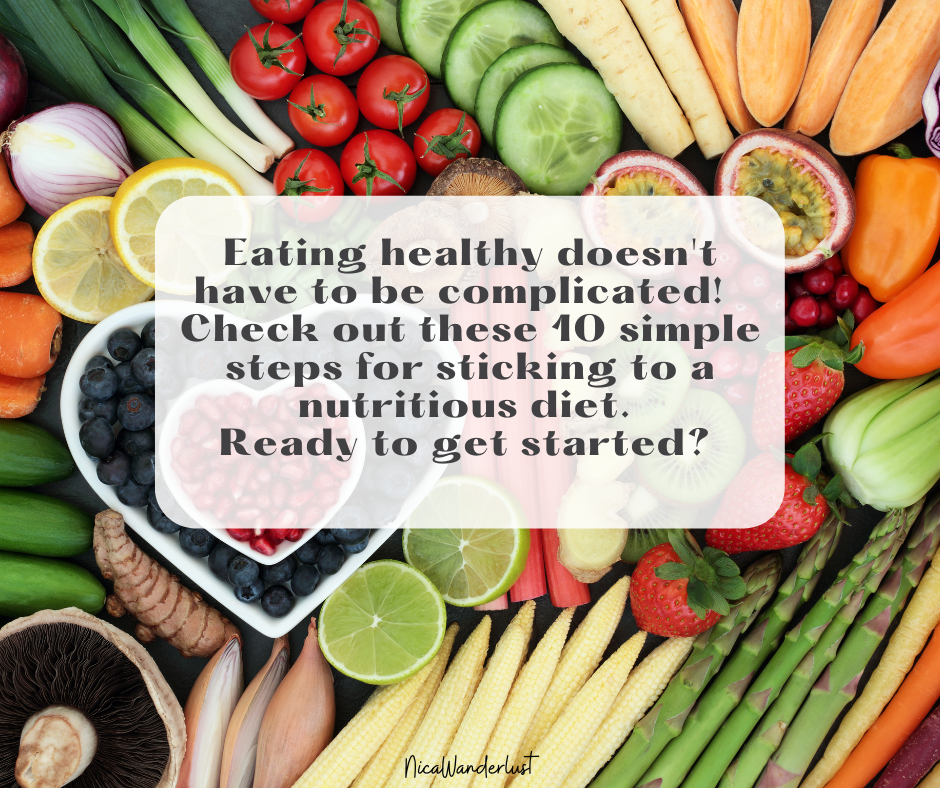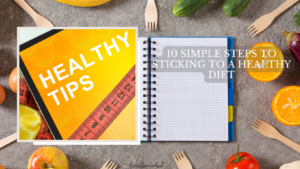Eating healthily can be a challenge in today’s hectic world. Unhealthy food choices constantly surround us, and it can be challenging to maintain a healthy lifestyle. Fortunately, plenty of strategies can help you stick to a healthy diet. This article will discuss some simple tips and tricks to stay on track with your diet. You’ll learn the importance of preparation, planning, and making healthy swaps for snacks and meals.
Eating healthily is one of the critical components of living a healthy life. Maintaining a healthy lifestyle can be challenging, but it is essential for feeling your best and reducing the risk of medical complications. Here are some tips to help you stick with a healthy eating lifestyle:
The first step in developing good eating habits is planning. Meal prepping once or twice weekly will save you time and money and allow you to easily make nutritious meals without thinking about what’s for lunch or dinner each day. Additionally, identifying which foods are staples that should always be on hand can also be beneficial; this might include things like oats, nuts, fruits, vegetables, and proteins like beans or fish.
Why you need to stick to a healthy eating lifestyle
It can often be challenging to stick with when it comes to eating healthy. People get busy and opt for convenient but unhealthy food choices. However, many benefits come from maintaining a healthy diet, such as improved moods and energy levels, better sleep, and more effective weight loss. Eating nutritious foods ensures you receive all the essential vitamins and minerals your body needs to function correctly and stay healthy.
Nutritious foods provide your body with the fuel it needs throughout the day while promoting good digestion. In addition, avoiding processed snacks and sugary drinks can help reduce your risk of developing chronic illnesses, such as type 2 diabetes or heart disease. Making smart food choices can also help increase your stamina so you can do more physical activities without tiring out too quickly.

Tip #1: Meal Planning
Meal planning is an essential part of sticking to a healthy diet. It allows you to plan and ensure you eat the right foods and get the right amount of nutrients. Here are some tips for meal planning that can help you stay on track with your nutrition goals and achieve better health.
First, it’s essential to have realistic expectations about what kind of meals you can create with the time and resources available. Set aside a specific day or two each week to grocery shop so that you always have fresh ingredients on hand when it’s time to cook. Second, try batch-cooking multiple meals at once; this will give you extra portions in your fridge or freezer for later in the week and reduce food waste.
Tip #2: Prepare Healthy Snacks
Eating healthily is a key part of maintaining a healthy lifestyle, and snack time can be crucial in sticking to a healthy diet. Preparing snacks at home can help ensure you stay away from unhealthy alternatives while still getting the nutrients your body needs. Here are some tips for preparing healthy snacks that keep you on track with your dietary goals.
First, plan! Consider what type of snack you want, shop for the ingredients in advance, and store them in the pantry or refrigerator, so you’re always ready for snack time. Also, look for recipes with nutrient-rich ingredients like nuts, seeds, fruits, and vegetables, as these will provide essential vitamins and minerals.
Tip #3: Avoid Processed Foods
Sticking to a healthy diet requires sticking with whole foods and avoiding anything heavily processed or modified from its natural state. Changing to a more nutritious diet can be difficult for many people, so it’s essential to understand how to avoid processed foods. Here are some tips on how to avoid processed foods while still sticking to a healthy diet:
First, always read nutrition labels carefully before buying any food product. Look out for words like “hydrogenated” and “partially hydrogenated,” as these indicate that a food has been processed and is not suitable for you. Additionally, items that contain long lists of unrecognizable ingredients are likely highly processed, so try your best to avoid them.
Second, buy fresh produce whenever possible – opting for fruits and vegetables instead of packaged snacks.
Tip #4: Eat More Veggies
Eating more veggies is one of the best tips for a healthy diet. Not only are vegetables packed with essential vitamins and minerals, but they can also provide significant health benefits when consumed regularly. Eating more vegetables can help people maintain a healthy weight, manage diabetes, reduce their risk of heart disease, and even reduce their risk of certain cancers.
Incorporating more vegetables into your daily diet doesn’t have to be complicated or time-consuming. There are plenty of simple ways to include them in meals, such as adding steamed broccoli florets to a salad or roasting cauliflower with spices and herbs. Make sure you vary the types of veggies you eat by including dark leafy greens like spinach and kale, reds like tomatoes and peppers, orange carrots and squash, beans and peas for protein, etc.
Tip #5: Limit Sugar & Salt Intake
Sticking to a healthy diet can be challenging, especially when checking sugar and salt. But with the right tips and tricks, having a nutritious meal plan is achievable! Here are some helpful tips for limiting sugar and salt intake while still getting all the essential nutrients you need.
First, try cutting out processed foods like chips or candy bars, as they are generally high in sugar and salt. Instead, choose more fresh options such as fruits, vegetables, and lean proteins. For example, grab an apple or banana for an equally satisfying snack instead of reaching for a cookie.
When grocery shopping, keep an eye out for food products with lower sodium content on their labels compared to others of the same kind.
Tip #6: Drink Plenty of Water
Having a healthy diet is key to leading a long and healthy life. Drinking plenty of water is essential to a balanced and nutritious diet. Water helps to regulate our body temperature, deliver nutrients to cells, and flush out toxins from the body. To ensure you’re getting enough water each day, here are some tips for sticking to a healthy diet that includes plenty of H2O:
Start your day with a glass of water as soon as you wake up. This can help kickstart your digestion process and get your metabolism going for the rest of the day. Additionally, ensure you always keep a bottle or glass of water nearby so it’s easy for you to stay hydrated throughout the day. Set reminders on your phone if necessary!
Tip #7: Eat Whole Grains
Whole grains are packed with essential vitamins, minerals, and fiber to help keep your body functioning correctly. When it comes to a healthy diet, whole grains should be a staple in everyone’s eating plan. Here are some tips for incorporating more whole grains into your diet:
Start by choosing oats, quinoa, brown rice, and bulgur wheat instead of refined white bread, cereal, and pasta. These whole grain choices will give you more nutrients than their processed counterparts. In addition to consuming more whole grains, try swapping out unhealthy snacks for ones that contain fiber-rich ingredients like popcorn and nuts. Aim for two or three servings of these snacks throughout the day for optimal nutrition.
Tip #8: Don’t Skip Meals
Eating well is essential for maintaining both physical and mental health. Consistently skipping meals can lead to unhealthy eating habits and make it challenging to stick to a healthy diet. Here are some tips for avoiding missed meals and maintaining a balanced diet:
First, keep snacks like nuts, fruits, pre-cut veggies, or low-sodium jerky on hand so you can quickly eat something when hunger strikes. Eating small snacks throughout the day will ensure you don’t miss meals due to lack of access. Second, try always to have breakfast – no matter how busy your mornings are! A quick piece of fruit or yogurt will still provide you with the nutrients your body needs early in the day and set you up for healthier eating choices later.
Tip #9: Read Labels
When it comes to eating a healthy diet, reading the labels of food items is essential. Doing so allows people to make informed decisions about what they eat and can help them stick to a healthier lifestyle. Knowing how to read food labels and what specific terms mean can be beneficial when trying to maintain an overall healthy diet.
Food labels list nutritional facts such as calories, fat content, dietary fiber, protein, carbohydrates, and sodium. It is essential for individuals who are consciously following a healthier diet plan to read the label and ensure that these values meet their dietary goals. Awareness of the ingredients list on food products gives consumers an idea of what kind of nutrients are consumed in each serving size.
Tip #10: Exercise Regularly
Exercising regularly is essential to maintaining a healthy lifestyle, but for many individuals, it can be not easy to stick to. Here are some tips for sticking to a healthy diet when exercising regularly to ensure that you stay on track with your fitness goals and eating habits.
First and foremost, ensure you are fueling your body correctly before and after workouts. Eating the proper nutrients before exercise will give you the energy needed to power through your routine, while post-workout snacks should consist of protein-rich foods that help repair muscle tissues. Additionally, be mindful of portion sizes; too little food won’t provide enough energy, and too much could lead to unhealthy weight gain.
In addition to eating the right amount of food at the right time, it is essential to remember hydration.
Conclusion: Make Healthy Choices
In conclusion, healthy choices for our bodies, minds, and souls are essential. Eating a balanced diet, engaging in regular physical activity, and maintaining a positive outlook can contribute to overall health and well-being. By making healthier choices today, we can enjoy a healthier future. Taking the time to take care of ourselves is an investment worth making. Finally, there is always time to start making healthier choices.

